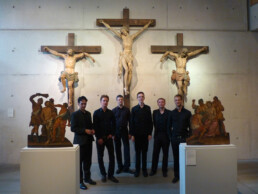On the occasion of the finissage of the exhibition “In our Soil. Grave finds of the Early Middle Ages in the Southwest“, the Schola Cantorum at the Institute of Musicology at the University of Tübingen, under the direction of Prof. Dr. Stefan Morent, will present a short programme in a livestream, which was originally intended as a musical accompaniment to the opening of the exhibition.
Although no direct written musical tradition has survived from the time of the excavation finds from the early Middle Ages, the process of incipient Christianisation quickly led to the establishment of religious centres in the German southwest as well, such as the island monastery of Reichenau in Lake Constance or the monastery of St. Gall. These monasteries also provided some of the earliest musical sources for liturgical chant, the so-called Gregorian chant, which shaped and structured both the celebration of Mass and the Liturgy of the Hours.
The contact surfaces between pagan traditions and Christianisation are reflected in the “Song of George”, which in Old High German shows the model of the heroic epic, but reworks it in Christian terms. It probably did not originate on the Reichenau, but corresponds with the veneration of the saint there.
Finally, the Christmas sequence by Notker Balbulus, the “Stammler”, who worked there as an eloquent poet-musician in the later 9th century, leads to St. Gall.
Artists
Schola Cantorum
at the Musicological Institute of the University of Tübingen
Conductor: Prof. Dr. Stefan Morent
Singers: Michael Braunger, Alexander Goossenns, Stefan Morent, Samuel Schick, Tilo Schmid-Sehl, Janis Tortora

Programme
- Introitus Statuit ei dominus
- Kyrie in summis
- Georgslied
- Alleluia Dies sanctificatus
- Notker Balbulus (840–912): Sequence Natus ante saecula
(all transcriptions and arrangements from the medieval manuscripts by Stefan Morent).
Registration is not required.
You can watch a recording of the online finissage here directly on our site or on the Youtube channel of the diocesan museum Rottenburg.